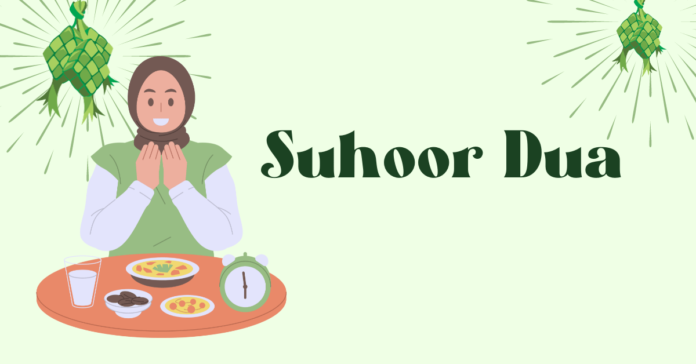Introduction
In the serene pre-dawn moments of Ramadan, Muslims around the world engage in a profound ritual known as Suhoor or Sehri. It’s a cherished time to gather with loved ones, reflect on spirituality, and fortify oneself for the day-long fast ahead. Central to this ritual is the Sehri Dua, a heartfelt supplication made before partaking in the pre-dawn meal. Let’s delve into the significance, practice, and spiritual essence of this beautiful tradition.
وَبِصَوْمِ غَدٍ نَوَيْتُ مِنْ شَهْرِ رَمَضَان ۔
Understanding Sehri Dua
At the core of Suhoor lies the intention to fast sincerely for the sake of Allah. This Dua encapsulates this intention, serving as a verbal commitment and a spiritual preparation for the day ahead. With its profound words, believers reaffirm their dedication to observe the fast diligently, seeking spiritual rewards and closeness to the Divine.

Anas (R.A) narrated Allah’s Messenger (Peace Be Upon Him) as saying: “Take meal a little before dawn, for there is a blessing in taking a meal at that time.” (Book 6, Number 2412)
The Holy Prophet (Peace Be Upon Him) Said: “Allah and His angels send mercy upon the people who consume Suhoor”. (Masnad Ahmed, Vol 4, Hadith 11396)
Zaid bin Sabit (R.A) said: “We took a meal shortly before dawn along with the Messenger of Allah (Peace Be Upon Him). We then stood up for prayer. I said: How much span of time was there between the two (acts, i.e. taking of Suhoor and observing of Fajr prayer)? He said (a span of reciting) fifty verses.” (Book 35, Number 2415)
Significance of Dua
The dua isn’t merely a ritualistic utterance but a profound act of worship. By reciting this dua, Muslims express their gratitude for the opportunity to fast and seek blessings for the endeavor ahead. It serves as a reminder of the spiritual significance of fasting, fostering mindfulness and devotion throughout the holy month of Ramadan.
Historical Context
The practice of reciting a dua before Suhoor finds its roots in the teachings of the Prophet Muhammad (Peace Be Upon Him). His exemplary conduct and guidance form the cornerstone of Islamic traditions, including the observance of fasting rituals. The Hadith literature contains numerous references to the importance of Sehri and the virtue of making a sincere intention before beginning the fast.
The Spiritual Essence of Dua
As the world slumbers in the quietude of the pre-dawn hours, believers awaken to partake in Suhoor, guided by a deep sense of spiritual consciousness. The act of reciting the Sehri Dua serves as a poignant reminder of one’s purpose during Ramadan: to seek spiritual elevation, self-discipline, and closeness to the Divine. It instills a sense of mindfulness, humility, and gratitude, setting the tone for a day of devotion and reflection.
Practical Guidelines for Reciting Suhoor Dua
While the words of the Suhoor Dua are simple, their spiritual significance is profound. Muslims are encouraged to recite the dua sincerely, with full awareness of its meaning and implications. It’s customary to make the intention for fasting while reciting the dua, ensuring clarity of purpose and devotion to the act of worship.
Common Misconceptions
In some communities, there may be misconceptions regarding the timing of Sehri and its relation to the Fajr prayer. It’s important to clarify that Sehri should be concluded a little before dawn, as per the guidance of the Prophet Muhammad (Peace Be Upon Him). The Sehri Dua marks the culmination of this pre-dawn meal, setting the stage for the commencement of fasting at dawn.
The Spiritual Benefits of Suhoor Dua
Beyond its practical implications, the Suhoor Dua holds profound spiritual benefits for believers. By reciting this supplication with sincerity and devotion, Muslims invite the mercy and blessings of Allah upon themselves. It serves as a spiritual anchor, strengthening one’s resolve to fulfill the obligations of fasting with excellence and sincerity.
Conclusion
As the dawn breaks and the world awakens to a new day, Muslims gather in quiet contemplation to recite the Sehri Dua. In its simplicity lies a profound act of worship, a heartfelt expression of devotion, and a reaffirmation of one’s commitment to spiritual growth. May the practice of reciting the Sehri Dua deepen our connection to the Divine and illuminate our paths with blessings throughout the holy month of Ramadan.

